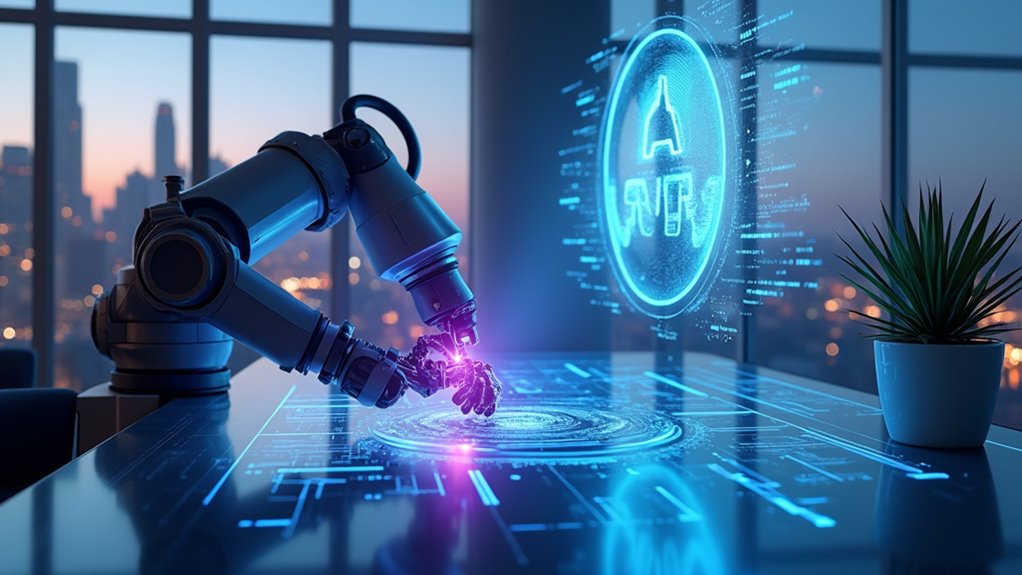Becoming an AI/ML engineer requires a solid foundation in mathematics, proficiency in Python, and familiarity with frameworks like TensorFlow and PyTorch. Start by mastering linear algebra, statistics, and calculus, then build practical projects for your portfolio. Most professionals have computer science degrees, but self-taught paths work too. You’ll need persistence—debugging models isn’t for the faint-hearted! Continuous learning is non-negotiable in this fast-evolving field. The rewards? High demand, great pay, and solving tomorrow’s problems today.

As artificial intelligence reshapes industries at breakneck speed, the demand for skilled AI/ML engineers has skyrocketed beyond what most tech observers predicted even five years ago. The career pathways for these professionals have diversified dramatically, with opportunities spanning from startups to Fortune 500 companies.
Skill development in this field requires deliberate practice and strategic learning—not just watching YouTube tutorials and hoping for the best.
Mastering AI demands calculated effort—passion without practice produces nothing but technical debt.
The foundation of any successful AI/ML engineer starts with solid mathematics. Linear algebra, calculus, probability, and statistics aren’t just fancy terms to drop at dinner parties—they’re the bedrock of understanding how machine learning actually works.
Python reigns supreme as the language of choice, and yes, you really do need to master it beyond just copy-pasting Stack Overflow solutions.
Educational options abound, but they’re not created equal. Traditional computer science degrees provide depth but may lack cutting-edge AI curriculum. Bootcamps offer speed but sometimes sacrifice fundamentals. Online courses? Convenient, but require iron discipline. Advanced roles typically require a master’s or Ph.D. in AI or machine learning for those aiming for research positions.
Choose your poison based on your learning style, not what’s trendy on Twitter.
Tools matter. TensorFlow, PyTorch, and scikit-learn aren’t just resume buzzwords—they’re everyday implements in the AI engineer’s toolkit. Data manipulation with Pandas and NumPy separates the professionals from the pretenders.
And cloud platforms? Learn them or perish in deployment hell.
Career progression typically begins with junior roles focused on implementation tasks before advancing to more strategic positions. The learning never stops—yesterday’s cutting-edge technique is tomorrow’s outdated approach.
Those who thrive maintain constant curiosity.
Engaging with the AI/ML community through conferences, meetups, and online forums provides invaluable networking opportunities that can accelerate your career growth and knowledge acquisition.
Building a strong portfolio of projects is essential for demonstrating your practical skills and understanding of AI concepts to potential employers.
The path to becoming an AI/ML engineer isn’t for the faint-hearted or intellectually lazy. It demands continuous learning, practical application, and persistence through frustrating debugging sessions.
But for those willing to invest the effort, few technical careers offer the same combination of intellectual challenge, societal impact, and financial reward. Choose wisely.
Frequently Asked Questions
What Is the Typical Salary Range for Ai/Ml Engineers?
AI/ML engineers command impressive salaries, typically ranging from $100,000 to $200,000 annually.
Industry standards vary greatly by location and experience level. In tech hubs like San Francisco, expect higher figures—sometimes pushing $250,000 with bonuses.
Salary negotiation is essential; don’t accept the first offer! Healthcare pays less (sorry), while real estate and IT sectors reward handsomely.
FAANG companies offer top-tier compensation packages, but they’ll work you to the bone.
Location and specialized skills can markedly impact your paycheck.
Do I Need a Ph.D. to Become an Ai/Ml Engineer?
No, a Ph.D. is not required to become an AI/ML engineer. Industry requirements typically specify a bachelor’s degree as the minimum qualification.
While Ph.D. advantages include deeper research capabilities and specialization opportunities, most entry-level positions prioritize practical programming skills and experience with frameworks like TensorFlow or PyTorch.
Many successful AI engineers have only bachelor’s degrees!
Want to stand out? Focus on building a strong project portfolio and staying current with industry trends instead of spending years in academia.
How Long Does It Take to Transition From Software Engineer?
Shifting from software engineering to AI/ML typically takes 6-18 months, depending on your dedication and existing background.
Skill acquisition is the real time-eater here—you’ll need to master Python, ML algorithms, and frameworks like TensorFlow or PyTorch.
Don’t just study theory! Project experience is non-negotiable. Start with simple models, then build progressively complex applications.
Which Industries Have the Highest Demand for Ai/Ml Engineers?
The highest demand for AI/ML engineers spans several key sectors.
Information Technology leads the pack, with healthcare applications following closely behind—think diagnosis algorithms and personalized treatment plans.
Finance analytics is booming too, though not mentioned in the background data.
Management consulting firms are scrambling for talent, while automotive and cybersecurity industries can’t hire fast enough.
Want job security? These fields are practically begging for qualified engineers who can translate complex data into business solutions.
Are Remote Work Opportunities Common in Ai/Ml Engineering Roles?
Remote work opportunities are increasingly common in AI/ML engineering roles. About 12% of ML engineer positions explicitly advertise as remote, with more offering job flexibility without labeling it in that manner.
Companies like Netflix and Alamere Inc. regularly post remote positions, recognizing that talent isn’t geographically bound.
Post-pandemic, the AI sector has embraced distributed teams—smart move, considering ML engineers can train algorithms from practically anywhere with a decent internet connection.









